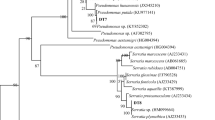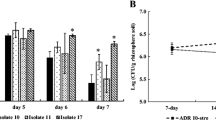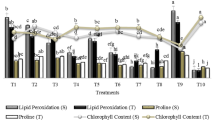Abstract
Plant growth promoting rhizobacteria (PGPR) have the potential to promote plant growth under extreme environmental conditions. The purposes of the present study were first to isolate and identify drought tolerant ACC deaminase producing PGPR from rhizosphere soil of cluster bean (Cyamopsis tetragonoloba), and second to study the effect of selected bacterial isolates on plant growth, nodulation and soil properties of cluster bean under drought. Rhizosphere bacterial isolates were tested for their drought tolerance ability, ACC deaminase activity and other PGP attributes such as the production of indole-3-acetic acid (IAA), ammonia, HCN, siderophore and phosphate solubilization. The selected isolates were identified by 16S rRNA sequencing analysis. These selected isolates were further evaluated for plant growth promoting traits and other attributes, such as ethylene emission, osmolytes accumulation, nutrients uptake, soil nutrient availability and soil enzymes activities under drought stress. Three isolates were positive for ACC deaminase activity and identified as Bacillus sonoresis (KM1), Psuedomonas stutzeri (AK17) and Paenibacillus polymyxa (KM6). Under drought stress, inoculation with AK17 and KM6 isolates significantly improved plant growth, RWC and lowered the ethylene emission as compared to uninoculated plants. These isolate also helped in mitigating the adverse effects of drought stress in Cyamopsis by enhancing the accumulation of proline, glycine betaine and decreasing lipid peroxidation. Availability of soil nutrients and soil enzymes activities were also increased in treated plants. These findings show that isolates AK17 and KM6 helps in improving tolerance of cluster bean seedling and can act as potent bioinoculants for crops cultivated under water-stressed conditions.





Similar content being viewed by others
References
Abdul-Baki AA, Anderson JD (1973) Vigor determination in soybean seed by multiple criteria 1. Crop Sci 13:630–633
Agarwal S, Grover A (2006) Molecular biology, biotechnology and genomics of flooding-associated low O2 stress response in plants. Crit Rev Plant Sci 25:1–21. https://doi.org/10.1080/07352680500365232
Ali SZ, Sandhya V, Rao LV (2014) Isolation and characterization of drought-tolerant ACC deaminase and exopolysaccharide-producing fluorescent Pseudomonas sp. Ann Microbiol 64:493–502. https://doi.org/10.1007/s13213-013-0680-3
Anderson E (1949) Endosperm mucilages of legumes. Ind Eng Chem 41:2887–2890. https://doi.org/10.1021/ie50480a056
Armon D (1949) Copper enzymes in isolated chloroplast. Plant Physiol 24:1–15
Athar A (1998) Drought tolerance by lentil rhizobia (Rhizobium leguminosarum) from arid and semiarid areas of Pakistan. Lett Appl Microbiol 26:38–42. https://doi.org/10.1046/j.1472-765X.1998.00272.x
Bakker AW, Schippers B (1987) Microbial cyanide production in the rhizosphere in relation to potato yield reduction and Pseudomonas spp-mediated plant growth-stimulation. Soil Biol Biochem 19:451–457. https://doi.org/10.1016/0038-0717(87)90037-X
Bates LS, Waldren RP, Teare I (1973) Rapid determination of free proline for water-stress studies. Plant Soil 39:205–207. https://doi.org/10.1007/BF00018060
Batool T, Ali S, Seleiman MF, Naveed NH, Ali A, Ahmed K, Abid M, Rizwan M, Shahid MR, Alotaibi M (2020) Plant growth promoting rhizobacteria alleviates drought stress in potato in response to suppressive oxidative stress and antioxidant enzymes activities. Sci Rep 10:1–19. https://doi.org/10.1038/s41598-020-73489-z
Beneduzi A, Ambrosini A, Passaglia LM (2012) Plant growth-promoting rhizobacteria (PGPR): their potential as antagonists and biocontrol agents. Genet Mol Biol 35:1044–1051. https://doi.org/10.1590/S1415-47572012000600020
Buckley S, Allen D, Brackin R, Jämtgård S, Näsholm T, Schmidt S (2019) Microdialysis as an in situ technique for sampling soil enzymes. Soil Biol Biochem 135:20–27. https://doi.org/10.1016/j.soilbio.2019.04.007
Chakraborty U, Chakraborty B, Chakraborty A, Dey P (2013) Water stress amelioration and plant growth promotion in wheat plants by osmotic stress tolerant bacteria. World J Microbiol Biotechnol 29:789–803. https://doi.org/10.1007/s11274-012-1234-8
Chandra D, Srivastava R, Glick BR, Sharma AK (2018) Drought-tolerant Pseudomonas spp. improve the growth performance of finger millet (Eleusine coracana (L.) Gaertn.) under non-stressed and drought-stressed conditions. Pedosphere 28:227–240. https://doi.org/10.1016/S1002-0160(18)60013-X
Damodharan K, Palaniyandi SA, Le B, Suh J-W, Yang SH (2018) Streptomyces sp. strain SK68, isolated from peanut rhizosphere, promotes growth and alleviates salt stress in tomato (Solanum lycopersicum cv. Micro-tom). J Microbiol 56:753–759. https://doi.org/10.1007/s12275-018-8120-5
Danish S, Zafar-ul-Hye M (2019) Co-application of ACC-deaminase producing PGPR and timber-waste biochar improves pigments formation, growth and yield of wheat under drought stress. Sci Rep 9:1–13. https://doi.org/10.1038/s41598-019-42374-9
Dworkin M, Foster J (1958) Experiments with some microorganisms which utilize ethane and hydrogen. J Bacteriol 75:592–603
Wang W, Vinocur B, Altman A (2003) Plant responses to drought, salinity and extreme temperatures: towards genetic engineering for stress tolerance. Planta 218:1–14. https://doi.org/10.1007/s00425-003-1105-5
Dye D (1962) The inadequacy of the usual determinative tests for the identification of Xanthomonas spp. N Z J Sci 5
Waraich EA, Ahmad R, Ashraf MY (2011) Role of mineral nutrition in alleviation of drought stress in plants. Aust J Crop Sci 5:764–777
Ehsan Mahdavi SM, Salehi H, Zarei M (2018) Can arbuscular mycorrhizal fungi ameliorate the adverse effects of deficit irrigation on tall fescue (Festuca arundinacea Schreb.). J Soil Sci Plant Nutr 18:636–652. https://doi.org/10.4067/S0718-95162018005001902
Emami A (1996) Plant decomposition methods. Vol. 1. Technical leaflet No. 982. Soil and Water Research Institute, Tehran
Fall D, Bakhoum N, Nourou Sall S, Zoubeirou AM, Sylla SN, Diouf D (2016) Rhizobial inoculation increases soil microbial functioning and gum arabic production of 13-year-old senegalia Senegal (L.) Britton, trees in the north part of Senegal. Front Plant Sci 7:1355. https://doi.org/10.3389/fpls.2016.01355
Fiske CH, Subbarow Y (1925) The colorimetric determination of phosphorus. J Biol Chem 66:375–400
Foley JA, Ramankutty N, Brauman KA, Cassidy ES, Gerber J, Johnston M, Mueller ND, O’Connell C, Ray DK, West PC (2011) Solutions for a cultivated planet. Nature 478:337–342. https://doi.org/10.1038/nature10452
García JE, Maroniche G, Creus C, Suárez-Rodríguez R, Ramirez-Trujillo JA, Groppa MD (2017) In vitro PGPR properties and osmotic tolerance of different Azospirillum native strains and their effects on growth of maize under drought stress. Microbiol Res 202:21–29. https://doi.org/10.1016/j.micres.2017.04.007
Gaur A (1990) Phosphate solubilizing micro-organisms as biofertilizer. Omega Scientific Publishers, New Delhi
Goel A, Sindhu S, Dadarwal K (2002) Stimulation of nodulation and plant growth of chickpea (Cicer arietinum L.) by Pseudomonas spp. antagonistic to fungal pathogens. Biol Fertil Soils 36:391–396. https://doi.org/10.1007/s00374-002-0554-5
Xie H, Pasternak J, Glick BR (1996) Isolation and characterization of mutants of the plant growth-promoting rhizobacterium Pseudomonas putida GR12-2 that overproduce indoleacetic acid. Curr Microbiol 32:67–71. https://doi.org/10.1007/s002849900012
Gray E, Smith D (2005) Intracellular and extracellular PGPR: commonalities and distinctions in the plant–bacterium signaling processes. Soil Biol Biochem 37:395–412. https://doi.org/10.1016/j.soilbio.2004.08.030
Grieve C, Grattan S (1983) Rapid assay for determination of water soluble quaternary ammonium compounds. Plant Soil 70:303–307. https://doi.org/10.1007/BF02374789
Gupta S, Pandey S (2019) ACC deaminase producing bacteria with multifarious plant growth promoting traits alleviates salinity stress in French bean (Phaseolus vulgaris) plants. Front Microbiol 1506. https://doi.org/10.3389/fmicb.2019.01506
Hare PD, Cress WA, Van Staden J (1998) Dissecting the roles of osmolyte accumulation during stress. Plant Cell Environ 21:535–553. https://doi.org/10.1046/j.1365-3040.1998.00309.x
Hinsinger P, Bengough AG, Vetterlein D, Young IM (2009) Rhizosphere: biophysics, biogeochemistry and ecological relevance. Plant Soil 321:117–152. https://doi.org/10.1007/s11104-008-9885-9
Hodges DM, DeLong JM, Forney CF, Prange RK (1999) Improving the thiobarbituric acid-reactive-substances assay for estimating lipid peroxidation in plant tissues containing anthocyanin and other interfering compounds. Planta 207:604–611. https://doi.org/10.1007/s004250050524
Hussain M, Malik M, Farooq M, Ashraf M, Cheema M (2008) Improving drought tolerance by exogenous application of glycinebetaine and salicylic acid in sunflower. J Agron Crop Sci 194:193–199. https://doi.org/10.1111/j.1439-037X.2008.00305.x
Jabborova D, Kannepalli A, Davranov K, Narimanov A, Enakiev Y, Syed A, Elgorban AM, Bahkali AH, Wirth S, Sayyed RZ (2021) Co-inoculation of rhizobacteria promotes growth, yield, and nutrient contents in soybean and improves soil enzymes and nutrients under drought conditions. Sci Rep 11:1–9. https://doi.org/10.1038/s41598-021-01337-9
Xie HT, Yang XM, Drury CF, Yang JY, Zhang XD (2011) Predicting soil organic carbon and total nitrogen using mid-and near-infrared spectra for Brookston clay loam soil in southwestern Ontario, Canada. Can J Soil Sci 91:53–63. https://doi.org/10.4141/CJSS10029
Ju W, Liu L, Fang L, Cui Y, Duan C, Wu H (2019) Impact of co-inoculation with plant-growth-promoting rhizobacteria and rhizobium on the biochemical responses of alfalfa-soil system in copper contaminated soil. Ecotoxicol Environ Saf 167:218–226. https://doi.org/10.1016/j.ecoenv.2018.10.016
Khalil M (2001) Biochemical and technological studies on the production of isolated guar protein. Food/Nahrung 45:21–24. https://doi.org/10.1002/1521-3803(20010101)45:1%3C21::AID-FOOD21%3E3.0.CO;2-J
Khan N, Bano A, Shahid MA, Nasim W, Babar A (2018a) Interaction between PGPR and PGR for water conservation and plant growth attributes under drought condition. Biologia 73:1083–1098. https://doi.org/10.2478/s11756-018-0127-1
Khan N, Zandi P, Ali S, Mehmood A, Adnan Shahid M, Yang J (2018b) Impact of salicylic acid and PGPR on the drought tolerance and phytoremediation potential of Helianthus annus. Front Microbiol 2507. https://doi.org/10.3389/fmicb.2018.02507
Kour D, Rana KL, Sheikh I, Kumar V, Yadav AN, Dhaliwal HS, Saxena AK (2020) Alleviation of drought stress and plant growth promotion by Pseudomonas libanensis EU-LWNA-33, a drought-adaptive phosphorus-solubilizing bacterium. Proc Natl Acad Sci India Sect B: Biol Sci 90:785–795. https://doi.org/10.1007/s40011-019-01151-4
Kruasuwan W, Thamchaipenet A (2018) 1-Aminocyclopropane-1-carboxylate (ACC) deaminase-producing endophytic diazotrophic Enterobacter sp. EN-21 modulates salt–stress response in sugarcane. J Plant Growth Regul 37:849–858. https://doi.org/10.1007/s00344-018-9780-4
Xiong W, Zhao Q, Zhao J, Xun W, Li R, Zhang R, Wu H, Shen Q (2015) Different continuous cropping spans significantly affect microbial community membership and structure in a vanilla-grown soil as revealed by deep pyrosequencing. Microb Ecol 70:209–218. https://doi.org/10.1007/s00248-014-0516-0
Labconco C (1998) A guide to Kjeldahl nitrogen determination methods and apparatus. Labconco Corporation, Houston
Ladd JN, Butler JHA (1972) Short-term assays of soil proteolytic enzyme activities using proteins and dipeptide derivatives as substrates. Soil Biol Biochem 4:227–237. https://doi.org/10.1016/0038-0717(72)90038-7
Li H, Qiu Y, Yao T, Ma Y, Zhang H, Yang X (2020) Effects of PGPR microbial inoculants on the growth and soil properties of Avena sativa, Medicago sativa, and Cucumis sativus seedlings. Soil Tillage Res 199:104577. https://doi.org/10.1016/j.still.2020.104577
Lim JH, Kim SD (2013) Induction of drought stress resistance by multi-functional PGPR Bacillus licheniformis K11 in pepper. Plant Pathol J 29:201. https://doi.org/10.5423/PPJ.SI.02.2013.0021
Zhang HX, Blumwald E (2001) Transgenic salt-tolerant tomato plants accumulate salt in foliage but not in fruit. Nat Biotechnol 19:765–768. https://doi.org/10.1038/90824
Liu X, Duan B, Li L, Chen G, Su-Zhou C, Li Y, Merkeryan H, Liu W (2021) ACC deaminase-producing PGPRs improve drought stress tolerance in grapevine (Vitis vinifera L.). Front Plant Sci 1849. https://doi.org/10.3389/fpls.2021.706990
Lowry O, Rosebrough N, Farr A, Randall R (1951) Protein measurement with the Folin phenol reagent. J Biol Chem 193:265–275
Magnucka EG, Pietr SJ (2015) Various effects of fluorescent bacteria of the genus Pseudomonas containing ACC deaminase on wheat seedling growth. Microbiol Res 181:112–119. https://doi.org/10.1016/j.micres.2015.04.005
Mayak S, Tirosh T, Glick BR (2004) Plant growth-promoting bacteria that confer resistance to water stress in tomatoes and peppers. Plant Sci 166:525–530. https://doi.org/10.1016/j.plantsci.2003.10.025
Michel BE, Kaufmann MR (1973) The osmotic potential of polyethylene glycol 6000. Plant Physiol 51:914–916. https://doi.org/10.1104/pp.51.5.914
Minhas PS, Rane J, Pasala RK (2017) Abiotic stresses in agriculture: an overview. Abiotic Stress Manag Resilient Agric 3–8. https://doi.org/10.1007/978-981-10-5744-1_1
Mukhtar HM, Ansari S, Bhat Z, Naved T (2006) Antihyperglycemic activity of Cyamopsis tetragonoloba. Beans on blood glucose levels in alloxan-induced diabetic rats. Pharm Biol 44:10–13. https://doi.org/10.1080/13880200500509025
Naveed M, Hussain MB, Zahir ZA, Mitter B, Sessitsch A (2014) Drought stress amelioration in wheat through inoculation with Burkholderia phytofirmans strain PsJN. Plant Growth Regul 73:121–131. https://doi.org/10.1007/s10725-013-9874-8
Niu X, Song L, Xiao Y, Ge W (2018) Drought-tolerant plant growth-promoting rhizobacteria associated with foxtail millet in a semi-arid agroecosystem and their potential in alleviating drought stress. Front Microbiol 8:2580. https://doi.org/10.3389/fmicb.2017.02580
Penrose DM, Glick BR (2003) Methods for isolating and characterizing ACC deaminase-containing plant growth-promoting rhizobacteria. Physiol Plant 118:10–15. https://doi.org/10.1034/j.1399-3054.2003.00086.x
Ravanbakhsh M, Sasidharan R, Voesenek LA, Kowalchuk GA, Jousset A (2018) Microbial modulation of plant ethylene signaling: ecological and evolutionary consequences. Microbiome 6:1–10. https://doi.org/10.1186/s40168-018-0436-1
Reysenbach AL, Giver LJ, Wickham GS, Pace NR (1992) Differential amplification of rRNA genes by polymerase chain reaction. Appl Environ Microbiol 58:3417–3418. https://doi.org/10.1128/aem.58.10.3417-3418.1
Ruiz-Lozano JM, Azcón R (1996) Mycorrhizal colonization and drought stress as factors affecting nitrate reductase activity in lettuce plants. Agric Ecosyst Environ 60:175–181. https://doi.org/10.1016/S0167-8809(96)01074-2
Saikia J, Sarma RK, Dhandia R, Yadav A, Bharali R, Gupta VK, Saikia R (2018) Alleviation of drought stress in pulse crops with ACC deaminase producing rhizobacteria isolated from acidic soil of Northeast India. Sci Rep 8:1–16. https://doi.org/10.1038/s41598-018-21921-w
Saleem AR, Brunetti C, Khalid A, Della Rocca G, Raio A, Emiliani G, De Carlo A, Mahmood T, Centritto M (2018) Drought response of Mucuna pruriens (L.) DC. Inoculated with ACC deaminase and IAA producing rhizobacteria. PLoS One 13(2):e0191218. https://doi.org/10.1371/journal.pone.0191218
Zhang N, Wang D, Liu Y, Li S, Shen Q, Zhang R (2014) Effects of different plant root exudates and their organic acid components on chemotaxis, biofilm formation and colonization by beneficial rhizosphere-associated bacterial strains. Plant Soil 374:689–700. https://doi.org/10.1038/90824
Sambrook J, Fritsch EF, Maniatis T (1989) Molecular cloning: a laboratory manual. Cold spring harbor laboratory press, New York
Sandhya V, Grover M, Reddy G, Venkateswarlu B (2009) Alleviation of drought stress effects in sunflower seedlings by the exopolysaccharides producing Pseudomonas putida strain GAP-P45. Biol Fertil Soils 46:17–26. https://doi.org/10.1007/s00374-009-0401-z
Sarker U, Oba S (2018) Augmentation of leaf color parameters, pigments, vitamins, phenolic acids, flavonoids and antioxidant activity in selected Amaranthus tricolor under salinity stress. Sci Rep 8(10):1038. https://doi.org/10.1038/s41598-018-30897-6
Sarwar M, Kremer R (1995) Determination of bacterially derived auxins using a microplate method. Lett Appl Microbiol 20:282–285. https://doi.org/10.1111/j.1472-765X.1995.tb00446.x
Schwyn B, Neilands J (1987) Universal chemical assay for the detection and determination of siderophores. Anal Biochem 160:47–56. https://doi.org/10.1016/0003-2697(87)90612-9
Sharma P, Gummagolmath K (2012) Reforming guar industry in India: issues and strategies §. Agric Econ Res Rev 25:37–48
Sims JT (2009) Soil test phosphorus: principles and methods. Methods of phosphorus analysis for soils, sediments, residuals and waters, 2nd edn. Southern Cooperative Series bulletin 9–19
Smol JP (2012) Climate change: a planet in flux. Nature 483:S12–S15. https://doi.org/10.1038/483S12a
Tabatabai MA (1994) Soil enzymes. In: Weaver RW (ed) Methods of soil analysis. Part 2: microbiological and biochemical properties. Soil Science Society of America, Madison, pp 775–833. https://doi.org/10.2136/sssabookser5.2.c37
Tabatabai MA, Bremner JM (1969) Use of p-nitrophenyl phosphate for assay of soil phosphatase activity. Soil Biol Biochem 1:301–307. https://doi.org/10.1016/0038-0717(69)90012-1
Tamura K, Nei M, Kumar S (2004) Prospects for inferring very large phylogenies by using the neighbor-joining method. Proc Natl Acad Sci 101:11030–11035. https://doi.org/10.1073/pnas.0404206101
Van Meeteren M, Tietema A, Van Loon E, Verstraten J (2008) Microbial dynamics and litter decomposition under a changed climate in a Dutch heathland. Appl Soil Ecol 38:119–127. https://doi.org/10.1016/j.apsoil.2007.09.006
Vanderstraeten L, Van Der Straeten D (2017) Accumulation and transport of 1-aminocyclopropane-1-carboxylic acid (ACC) in plants: current status, considerations for future research and agronomic applications. Front Plant Sci 8:38. https://doi.org/10.3389/fpls.2017.00038
Vurukonda SSKP, Vardharajula S, Shrivastava M, SkZ A (2016) Enhancement of drought stress tolerance in crops by plant growth promoting rhizobacteria. Microbiol Res 184:13–24. https://doi.org/10.1016/j.micres.2015.12.003
Acknowledgments
This work was funded by the Department of Science and Technology (DST) New Delhi under Women Scientist (WOS-A) scheme. The authors are thankful to the funding agency and to the DST-FIST sponsored Department of Microbiology and Biotechnology, Gujarat University for providing the required facilities to carry out this work.
Funding
This work was funded by the Department of Science and Technology (DST) New Delhi under Women Scientist (WOS-A) scheme (Sanction No. SR/WOS-A/ LS-194/2018).
Author information
Authors and Affiliations
Contributions
All authors contributed to the study conception and design. Material preparation, data collection and analysis were performed by Ritika Jain. The first draft of the manuscript was written by Ritika Jain and all authors commented on previous versions of the manuscript. All authors read and approved the final manuscript.
Corresponding author
Ethics declarations
Conflict of interests
The authors have no conflict of interest to declare.
Additional information
Publisher’s note
Springer Nature remains neutral with regard to jurisdictional claims in published maps and institutional affiliations.
Supplementary Information
ESM 1
(DOCX 253 kb)
Rights and permissions
Springer Nature or its licensor (e.g. a society or other partner) holds exclusive rights to this article under a publishing agreement with the author(s) or other rightsholder(s); author self-archiving of the accepted manuscript version of this article is solely governed by the terms of such publishing agreement and applicable law.
About this article
Cite this article
Jain, R., Saraf, M. ACC deaminase producing PGPR modulates nutrients uptake, soil properties and growth of cluster bean (Cyamopsis tetragonoloba L.) under deficit irrigation. Biologia 78, 2303–2316 (2023). https://doi.org/10.1007/s11756-023-01376-9
Received:
Accepted:
Published:
Issue Date:
DOI: https://doi.org/10.1007/s11756-023-01376-9




